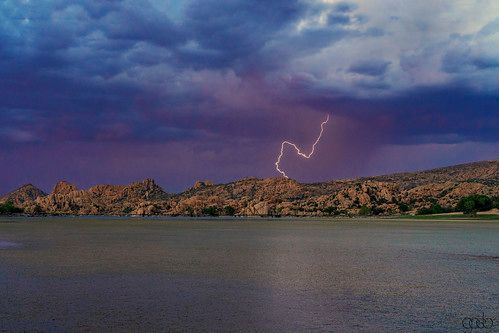Summer Proofing Your Home For Monsoon Season

Summer Proofing Your Home For Monsoon Season
To summer-proof your home for the monsoon season, focus on mitigating flood risks, securing your property from high winds, preparing for potential power outages, and managing the intense heat. Monsoon season in Arizona runs from mid-June through September and is known for severe thunderstorms, heavy rain, and dust storms.
Prepare your home's exterior
Inspect your roof: Before the storms begin, check for missing or damaged shingles and signs of wear. Heavy rainfall and winds can exploit even small issues. Consider having a professional inspection for peace of mind, especially if your roof has low-sloping areas that can trap water.
Clear drainage systems: Clogged gutters and downspouts are a leading cause of leaks and foundation damage. Clear out leaves, twigs, and other debris to ensure rainwater can flow freely away from your house. The City of Prescott also recommends cleaning street-level storm drains and culverts.
Address landscape drainage: Proper yard grading is crucial to direct water away from your home's foundation. If water pools near your house, you may need to reshape the low spots. For properties on or near a slope, consider adding natural barriers like retaining walls or river rock to control erosion. Secure outdoor items: High winds can turn loose items into dangerous projectiles. Move patio furniture, umbrellas, grills, and other unsecured items indoors or tie them down securely. Trim dead or weak tree branches that could snap off and damage your house or windows. Reinforce windows and doors: Check the seals around all windows and doors and install weather stripping to prevent leaks. For older homes, consider temporary measures like plywood covers or investing in permanent solutions like storm shutters or impact-resistant window film.
Prepare for power outages
Create an emergency kit: Assemble a kit with essentials in case of a prolonged outage. It should include a first-aid kit, a battery-powered radio, flashlights, extra batteries, and a portable charger for your phone.
Protect electronics: Power surges from lightning strikes can damage sensitive electronics. Unplug non-essential appliances and use surge protectors for your most important equipment.
Stock up on supplies: Have an ample supply of non-perishable food and bottled water. In case of an outage, keep your refrigerator and freezer doors closed to preserve perishables.
Prepare medical equipment: If anyone in your household uses life-sustaining medical equipment that requires electricity, register for the APS Medical Care Program to alert the utility company of your needs.
Know your garage door: Learn how to manually open your automatic garage door in case the power goes out.
Protect against flooding
Use sandbags: For properties in low-lying areas or with a history of flooding, have sandbags readily available. Yavapai County provides free sand and filling locations for residents.
Elevate utilities: If your furnace, water heater, or electrical panel are in a flood-prone area of your home, consider elevating them.
Clear drainage channels: If your property has a natural wash or drainage channel running through it, keep it clear of debris, overgrown vegetation, and obstructions to ensure proper water flow.
Beat the summer heat
Service your AC: Have your air conditioning unit professionally serviced before the peak summer heat to ensure it runs efficiently and reliably.
Add sun blockers: Install shade screens or thermal curtains on windows to block the sun's rays and keep your home cooler, reducing your cooling costs.
Check attic ventilation: Ensure your attic has proper ventilation to allow hot, moist air to escape, which prevents mold and keeps your home cooler overall.
Use ceiling fans: Run ceiling fans in a counter-clockwise direction to create a downward draft of cool air. This allows you to feel cooler without having to lower the thermostat.